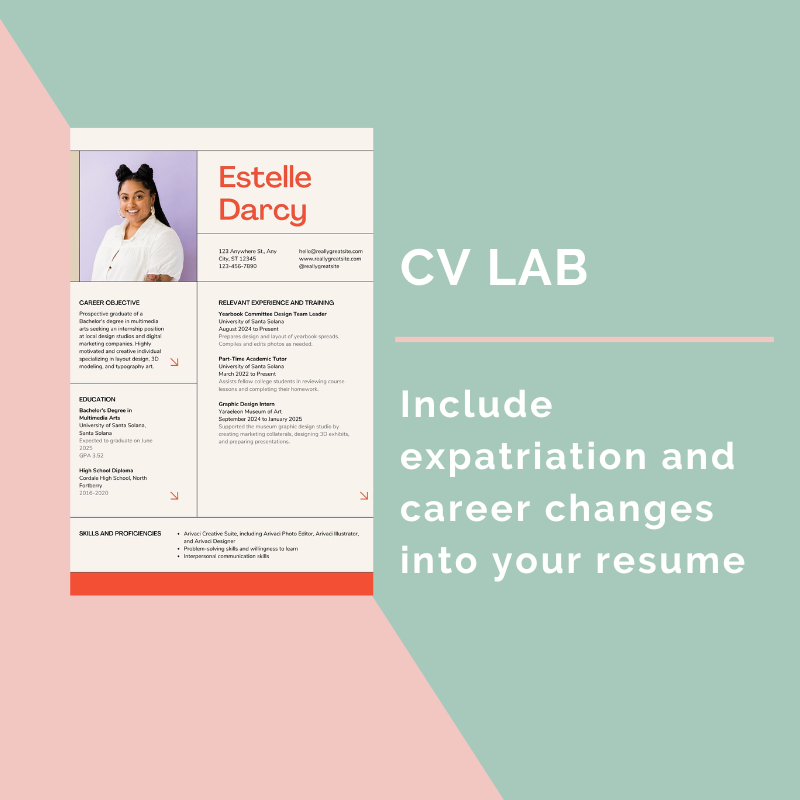
How moving back home triggers your identity and affects your career planning
What happens to my own self-perception when we pack our bags as a family and move back to our Passport Country? For many women, especially those who had paused their career, this moment is often the impulse to re-enter the labor market as a matter of course. For many, the question arises: what does the move mean for myself? For my career plans and personal future? In this blog post, I provide insights into what changes from a psychological perspective and what the return to work means.
What is identity anyway?
Explaining the concept of identity in black and white is not always easy. Identity is rather a feeling which is difficult to grasp. Often we question our identity only when it does not seem to be in harmony.
I love this definition (by Köck & Ott from 1997) because it understands identity as a constantly changing self-image: „Identity refers to the complete agreement of an individual or a thing with itself. In relation to human identity, psychology speaks of a dynamic self-concept that is in development throughout life, continuously changing in interaction with the social environment and in the form of identity crises“.
"Identity refers to the complete agreement of an individual or a thing with itself. In relation to human identity, psychology speaks of a dynamic self-concept that is in development throughout life, continuously changing in interaction with the social environment and in the form of identity crises."

The three pillars of your identity
Your identity is shaped by many aspects. I love to introduce the following three pillar of the personal, interpersonal and social identity.
While the personal identity comprises aspects such as your values, goals and fundamental beliefs. Mostly these fundamental things are formed in adolescence and for many these are stable throughout life.
The second pillar is called the interpersonal identity and reflects the roles we are playing in life: Whether this is being a mum, a wife, an employee or a supervisor.
The third pillar, called social identity, describes your sense of belonging to a group. This can be based on characteristics such as gender, occupation, religion, interests and much more.
PERSONAL IDENTITY
INTERPERSONAL IDENTITY
SOCIAL IDENTITY
The effect of repatriation on the three pillars of your identity
So what happens, when you are packing your bags and moving back to your home country? Well, one can perfectly describe that going through each of these different pillars of your identity.
Let’s start with your personal identity and the long shaped, fundamental beliefs and values that you have created over a course of time. By intense life events, such as moving across the globe, many start to question these values that they felt so sure about for such a long time. You are coming back to a home culture that feels different because you have become a different person due to everything tat happened to you and your family while living abroad. That triggers a feeling of uncertainty and the question of : Who will I be now?
In connext of your interpersonal identity, repatriation triggers the question of what kind of role you will have now within your family. Especially in the traditional assignment situation where one partner is working from the start and the other has to figure out the WHAT and HOW first, a re-traditionalization of roles happened. While both partners might have worked in a dual-career couple scenario, many expat families are undergoing a re-traditionalization of roles out of necessity or limited options. When moving back the questions arise: Do we want to stick to this family dynamic? Do we go back to our former family structure before moving countries? Do we need help from outside to make that happen? Should we focus on the kids first? So while many women carry the question of their professional future with them they also ask themselves how this professional future will be linked to their family obligations.
And finally, the social identity. We are prepared to enter unknown social circles when moving abroad but many are taken by surprise to find their home country to be a new unknown social circle as well. You have changed while living abroad, your extended family and friends might have changed and you feel disconnected from social circles and social norms that once gave you comfort and stability. As an effect we are living outside our comfort zone 24/7 and it is not the best supportive atmosphere to make bold professional decisions at the same time.
PERSONAL IDENTITY
= values, beliefs
Effect of repatriation
Questioning the status quo
INTERPERSONAL IDENTITY
= your social role
Effect of repatriation
Going back to former roles?
SOCIAL IDENTITY
= group belonging
Effect of repatriation
Feeling disconnected
A lot of change!
I love to go through these three identity pillars with my clients and see in which intensity which one is currently under change. But also as a preparation for major life changes like an international move these reflections are very helpful.
I often experience that my clients are kinder and milder with themselves afterwards, because they have become aware of how much uncertainty and change they are currently dealing with, while they often organize stability for their children or environment. Also the question of the professional future can be looked at in a much more holistic way and also takes into account factors such as the role model within the family and the social safety net.
If you would like to know more about this or my work as a coach, please send me a short message to info@sharethelove.blog or book a Discovery Call in my calendar here. I’ll be happy to tell you more about how I work during the free get-to-know-you call.

Thanks for following along!










